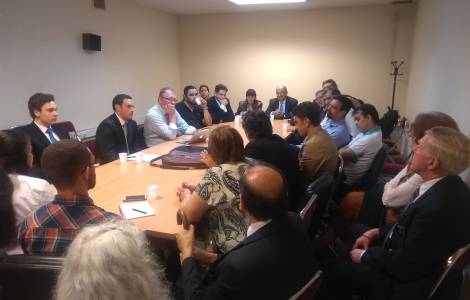
Buenos Aires (Agenzia Fides) - The G20 Interreligious Forum has recorded a great wealth of thematic proposals and an unprecedented participation of political authorities (see Fides 26/09/2018). Religions will help "give life to the achievement of the UN 2030 development goals". This is what is stressed in a dialogue with Agenzia Fides by Professor Cristina Calvo, director of the program "Democracy, society and new economies" of the University of Buenos Aires, consultant for Caritas Latin America and a member of the World Conference of Religions for Peace. (WCRP). Prof. Calvo draws up a report of the event, entitled "Building a consensus for a fair and sustainable development", which brought together for the first time from 26 to 28 September the inter-institutional group "Ethics and Economics" and the organizations that make up the ‘Interreligious G20’".
Calvo notes how the union of two paths (the first, with academic and economic components, the second, interreligious and social), allowed a useful discussion on issues such as religious freedom, human mobility, environmental justice, economy, finance, human development, fight against organized crime, all with the common denominator of "sustainable development". This allowed us to "exchange visions and good practices" thanks to the presence of the Argentinian national authorities, such as vice-president Gabriela Michetti, two ministers and two undersecretaries".
The proposals of the Forum will soon reach the G20 governments. According to Elena López Ruf, of the Argentine ecumenical NGO CREAS, the work carried out in Buenos Aires allowed the individual participating organizations to establish "strategic alliances".
The presence of "decision makers from various countries who were able to interact directly with civil society organizations and religious organizations operating in sectors such as education, health or humanitarian emergencies, such as refugees was important".
Calvo and López Ruf recognize the worldwide leading role of Pope Francis and Laudato Sì, which "is a framework of reference recognized by social actors, academics and the public administration far beyond the options of faith", says Cristina Calvo.
While the Interreligious G20 unites world-wide religion organizations, the "Ethics and Economics" Group is made up of different Latin American and non-Latin American organizations (among others Caritas, Celam, Alliance of Presbyterian and Reformed Churches, UN Program for Development, Inter-American Development Bank). (SM) (Agenzia Fides, 09/10/2018)